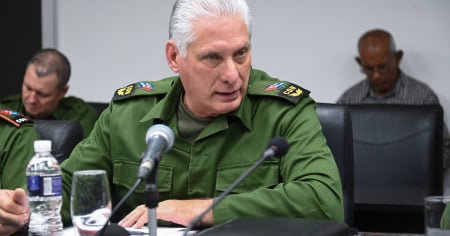The Cuban leader Miguel Díaz-Canel Bermúdez acknowledged on Thursday the country's resource limitations in ensuring proper military preparation in light of a potential invasion by the United States.
The statements were made during a meeting of the Provincial Defense Council in Mayabeque, as part of the Strategic Exercise Bastion 2024, which began on Wednesday and concludes this Friday in Cuba.
"In the current conditions of the country, we cannot expect that resources will arrive centrally and that demands will be met. We need to take advantage of territorial potentials and ensure that actions (of military preparation) are carried out in a decentralized manner," affirmed Díaz-Canel.
The leader suggested avoiding military maneuvers that involve a high consumption of resources, arguing that the government is not in an economic position to sustain such efforts.
The Bastion Exercise 2024 is led annually by the Cuban Army with the aim of "preparing the country for defense." In this edition, Díaz-Canel urged the strengthening of the "concept of total people's war" and to intensify military preparation throughout the national territory.
"This year will be one of intense preparation for defense, and we will be coordinating all the times when we will have activities. We have to do this with great systematization," he expressed.
The current situation, according to Díaz-Canel, is unfolding in a context of "political and economic aggression" by the United States, whom he blamed for the deterioration of social and economic conditions on the island.
The leader cited the decisions made by the Trump Administration, such as the reinstatement of Cuba on the list of state sponsors of terrorism, as examples of policies he described as "hegemonic and interventionist."
These statements come at a critical moment for Cuba, characterized by uncontrolled inflation, constant blackouts, and a shortage of food that have increased public discontent, while low levels of participation in the regime's calls are being recorded.
The call to prepare for "the war of all the people" also comes in the wake of the tragedy in Holguín, where 13 people, including nine recruits, lost their lives in an accident at an ammunition depot. This incident has sparked criticism regarding the conditions under which the Cuban military system operates.
The Bastion Exercise 2024 was inaugurated by Raúl Castro, who at 93 years old has taken on a more visible role in public events, reinforcing the official narrative of resistance against "external aggressions." However, the wear and tear of decades of crises remains the greatest challenge for the ruling elite in Cuba.
Frequently Asked Questions about Military Preparation and Crisis in Cuba
What has Díaz-Canel admitted about Cuba's military preparation?
Díaz-Canel has acknowledged that Cuba faces resource limitations to ensure adequate military preparedness in the event of an invasion. This was stated during the Strategic Exercise Bastión 2024, where he emphasized the need for decentralized actions due to the lack of centralized resources.
What is the current context of the economic crisis in Cuba?
Cuba is experiencing a severe economic and social crisis, characterized by uncontrolled inflation, constant blackouts, and lack of food. Díaz-Canel has blamed U.S. policies, such as the embargo, for the deterioration of conditions on the island, although economic problems have worsened during his term.
What measures has Díaz-Canel proposed to address the crisis in Cuba?
Díaz-Canel has proposed strengthening the "concept of total people's war" and increasing military preparedness. However, he has avoided scheduling resource-intensive maneuvers due to the country's lack of economic capacity. He has not provided concrete solutions for the structural issues of the Cuban economy.
How has the Cuban population reacted to the current situation?
The Cuban population has shown growing discontent regarding the economic situation and government statements. Discontent is manifesting in protests and criticisms on social media, where many believe that the government's rhetoric is out of touch with reality and lacks a clear action plan.
What has been the Cuban government's response to international criticism?
The Cuban government, led by Díaz-Canel, has blamed the policies of the United States for the country's economic situation. They have described these policies as hegemonic and interventionist, especially following Cuba's reinstatement on the list of state sponsors of terrorism by the Trump administration.
Filed under:
